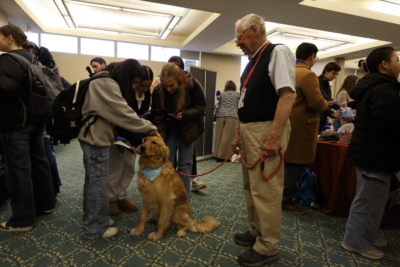This fall, the faculty voted to approve several academic changes including launching a Masters in Social Work program, updating the Core curriculum and adding two new minors. Changes to a few other programs, like the interdisciplinary major and the social policy and advocacy minor were also approved.
Most of the changes will take effect with the incoming class next fall, while current students will be given the option to adopt the changes.The faculty body voted on the changes at meetings in the last couple of months and will vote once more at the final meeting of the semester in December.
“We try and get [the changes] done in the fall so that we can put them in the catalog for next year,” said Ann Vendrely, the vice president for academic affairs and academic dean.
The most notable change, according to Vendrely, is the new MSW that Goshen College is developing in collaboration with Bluffton University (BU). For years, graduates from GC’s social work program and employers in the area have requested that the college develop a master’s program. Combining resources with Bluffton University will make this feasible.
GC and BU are currently searching for someone to direct the program. Once the director is picked, new faculty will be hired.
The MSW will not be the first collaboration between Goshen College and Bluffton University. The two universities are already partners in the Collaborative MBA and Collaborative for Sociology programs.
The first cohort in the MSW will start in the fall of 2023, with students fulfilling either one or two years depending on if they already have an undergraduate degree in social work.
The program will combine Anabaptist values with the core values of the social work profession.
“The goal is not [necessarily] to produce Anabaptist social workers,” said Jean Liechty, a professor of social work at GC who helped to brainstorm the new program. “The goal is to produce a social work program and degree that is grounded in those values, that invites students to think about how their personal values fit with the professional values.”
Goshen College’s Core curriculum is a second area that will undergo changes.
Suzanne Ehst, the Core curriculum director, sees the changes more as updates than a major overhaul. Overall, she is pleased with the Core curriculum, which includes first-year courses like Identity, Culture and Community, perspectives requirements and global education.
But, she said, “We want to keep [it] fresh. We want to continually be evaluating what it is we’re requiring, whether or not we’re meeting our learning goals.”
The biggest changes, Ehst said, will happen within the Study-Service Term Alt program. Instead of taking a random collection of classes to fulfill the SST requirement, students who opt out of doing a full semester of SST will take a more cohesive thread of courses that focuses on a specific issue and combines immersive cultural experiences, service and the development of cultural competency skills.
There will also be changes to English and math requirements for first-year students starting next fall.
For current students, possibly the most pertinent change is the addition of new minors in disability studies and public health.
The minor in disability studies will be offered through the education department under the direction of Brooke Lemmon, professor of education and director of special education.
The new minor is a response to requests from students outside the education department who were interested in learning about special education.
“This minor is created specifically for people in other fields,” said Kathy Meyer Reimer, a professor of education, “nursing, social work, ASL, business, communications, art, theater, music, the sciences, kinesiology — anyone who interacts with anyone who has a disability.”
“Students in this minor will learn about accessibility,” Meyer Reimer said. “They will broaden their perspectives and increase their understanding of diversity and the diverse needs of others and themselves.”
The second new minor, public health, is also meant to cater to a wide range of students.
The minor will be overseen by Brianne Brenneman, a professor of public health who was hired when the major was created in 2020.
“We had students that were trying to double major [in public health],” said Vendrely, “and it seemed like a minor was probably a better option for [some] people.”
Like the major, the public health minor will cover a broad range of topics including environmental health, policy, health education, nutrition and epidemiology (the study of the spread of diseases).
Public health is very applied, Brenneman explained. In each course, students are presented with an issue relating to racism, poverty, environmental hazards or access to resources and learn to problem solve using specific skills like grant writing or program evaluation.
“I think it pairs really well with a lot of different majors,” Brenneman said.
She suggested nursing, medicine, social work, business, history and peace, justice and conflict studies as especially good fits.
Isabella Ruiz, a first-year, has chosen to combine public health with a major in sustainability studies.
A double major who doesn’t plan on switching to the minor, Ruiz has dreams of a career in resource or environmental crisis management.
“I have been most interested in focusing on water quality,” she said, “which … is both an environmental issue and a public health issue.”
In Ruiz’s opinion, public health should be considered by students in many fields.
“If COVID-19 taught us anything,” she said, “it’s the importance of public health. Every field of career found itself facing a massive public health crisis and having to take action to prevent the spread of the virus.”



